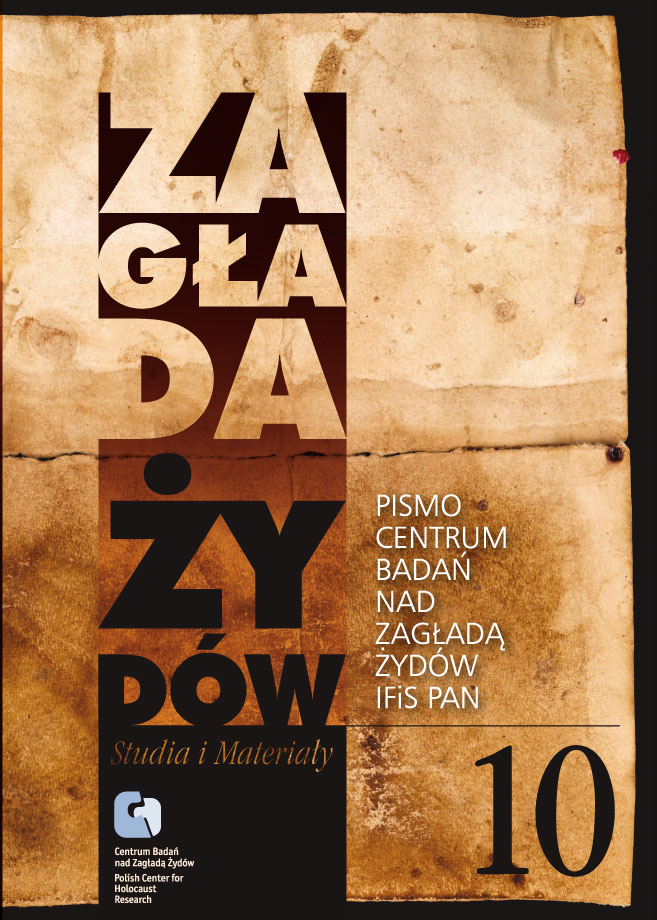Krzesiny and Kreising Between Remembrance and Disregard: A Small Polish Township amidst History, Memory, and Competitive Martyrdom
Zagłada Żydów. Studia i Materiały, No. 10 (2014), Pages: 443-461
Submission Date: 2020-10-22Publication Date: 2014-12-01
 https://doi.org/10.32927/ZZSiM.532
https://doi.org/10.32927/ZZSiM.532
Abstract
The area around Krzesiny, located near the city of Poznań, Poland, witnessed several dark events during World War II: Germans oppressed the local population, culminating in a terrorizing action dubbed “akcja krzesińska;” also, a forced labor camp, named “Kreising,” was built near the township, housing mainly Jews. After the war, the suffering in Krzesiny was remembered, but selectively – “akcja” and other forms of Polish suffering were commemorated, while the camp was not. By exploring the “lieux de mémoire” in Krzesiny – dynamics of memory in a small township in Poland – this paper uses localized research to address the issue of gaps in collective memory and commemoration. We briefly look at the relevant history, Polish memory regarding wartime events in Krzesiny, and the postwar dynamics of collective memory. Discussing the latter, we identify a new phenomenon at work, one which we dub “collective disregard” – group neglect of the past of the “Other” that occurs without clear intent. We argue that “collective disregard” is an issue that naturally occurs in the dynamics of memory. By making a deliberate investment in balanced remembrance and commemoration, societies can counter the tendencies of “disregard” and curb the controversies of competitive victimization claims, also called “competitive martyrdom”.
License
Copyright (c) 2014 Author&"Holocaust Studies and Materials"

This work is licensed under a Creative Commons Attribution 4.0 International License.
https://creativecommons.org/licenses/by/4.0
The journal is published under the Diamond Open Access Standard, CC-BY-4.0 Deed - Attribution 4.0 International - Creative Commons
Similar Articles
- Gabriel Finder, The Trial of Shepsl Rotholc and the Politics of Retribution in the Aftermath of the Holocaust , Zagłada Żydów. Studia i Materiały: No. 2 (2006)
- Marta Duch-Dyngosz, In Search of Local Memory of the Holocaust. The Case of Commemoration of Jewish Communities in Smaller Towns in Contemporary Poland , Zagłada Żydów. Studia i Materiały: No. 17 (2021)
- Joanna Gubała-Czyżewska, Commemoration of Jewish Łódź: how the past manifests itself in the present , Zagłada Żydów. Studia i Materiały: No. 16 (2020)
- Dariusz Libionka, Adam Kopciowski, The Life and the Holocaust in Hrubieszów in the Eyes of a Young Woman from Warsaw , Zagłada Żydów. Studia i Materiały: No. 3 (2007)
- Anna M. Rosner, Kindertransports – British Campaigns to Rescue Jewish Children during 1938–1939 , Zagłada Żydów. Studia i Materiały: No. 12 (2016)
- Jacek Leociak, Understanding the Holocaust. A Task for Generations , Zagłada Żydów. Studia i Materiały: 2008: Holocaust Studies and Materials
- Michał Kowalski, Treblinka Penal Labor Camp I as Presented in Jewish Testimonies , Zagłada Żydów. Studia i Materiały: No. 18 (2022)
- Marta Duch-Dyngosz, Magdalena Waligórska, The Boundaries of Collaboration in the Perception of Court Witnesses of the August Trials , Zagłada Żydów. Studia i Materiały: No. 19 (2023)
- Natalia Aleksiun, When Fajga Left Tadeusz. Wartime Relationships of Survivors after the Holocaust , Zagłada Żydów. Studia i Materiały: No. 17 (2021)
- Stefan Marcinkiewicz, Sammellager Bogusze (November 2, 1942 – January 3, 1943) as an example of a transitional collective camp in the Operation “Reinhardt” in the Bialystok District , Zagłada Żydów. Studia i Materiały: No. 20 (2024)
1 2 3 4 5 6 7 8 9 10 11 12 13 14 15 16 17 18 19 20 21 22 23 24 25 26 27 28 29 30 31 32 33 34 35 36 37 38 39 40 41 42 43 44 45 46 47 48 49 50 > >>
You may also start an advanced similarity search for this article.
 English
English
 Język Polski
Język Polski








